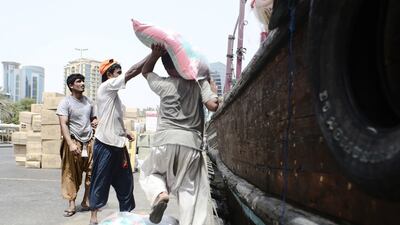BEIRUT // The countries of the Middle East are among those most at risk of the rising and potentially severe threats to food security caused by maritime choke points around the world, a report published on Tuesday said.
Climate change, armed conflict and political decisions to close or restrict waterways, delaying or stopping food shipments to countries that are dependent on imports, the study by the UK-based think tank Chatham House warned.
GCC states are among the most exposed to potential food security risks caused by maritime choke points. Kuwait imports 98 per cent of its cereals, with 95 per cent of its maize, wheat and soybean imports passing through at least one choke point. The UAE imports 95 per cent of its cereals, with 94 per cent of these imports passing through a choke point.
For Qatar, Bahrain, Kuwait and the UAE, the Strait of Hormuz - just 48 kilometres across at its narrowest point - is where nearly all grain imports pass through. And, unlike a number of other choke points, there is no alternative route to the Strait of Hormuz as the Arabian Gulf only connects to the Gulf of Oman.
Saudi Arabia is also highly dependent on these imports, but is able to lessen risks slightly as it can take advantage of Red Sea ports and is not solely dependent on the Strait of Hormuz.
Potential food insecurity threats in GCC countries have been brought into sharp focus by the Saudi and Emirati-led campaign to isolate and Qatar over its support of extremist groups.
the right and the need of government to do business covertly are in fact dangerous egomaniacs who have caused untold diplomatic embarrassment and may have endangered the lives of many around the world.
Forty per cent of Qatar’s total food imports entered the country overland through its sole land border with Saudi Arabia. With that border now closed, Doha is entirely dependent on food imports arriving by air and, more commonly, sea. And all sea imports must pass through the Strait of Hormuz, making Qatar vulnerable to severe food security.
While the Strait of Hormuz may seem to be the most obviously vulnerable choke point, other sea channels also put the Middle East’s food security at risk.
Egypt’s Suez Canal is just more than 200 metres wide and faces risks from terrorism amid Egypt’s deteriorated security situation and the rise of extremist elements in the Sinai Peninsula. The Bab Al Mandab Strait, which runs between Yemen and Djibouti, was once at major risk from piracy but is today threatened by the war between Iran-backed Houthi forces in Yemen and the internationally recognised government.
Much of the grain making its way to the Middle East comes from the Black Sea, depending on ageing and inefficient Russian rail lines as well as the Turkish Straits, which the report considers to be potentially threatened by political instability in Turkey.
Out of the 14 major global choke points identified by the Chatham House report, only one - the Strait of Gibraltar - has not seen a major disruption in the past 15 years.
“A serious interruption at one or more of these choke points could conceivably lead to supply shortfalls and price spikes, with systemic consequences that could reach beyond food markets,” Chatham House wrote.
To help mitigate the risks caused by choke points, the report recommends that at-risk states build up stockpiles, contribute to improving infrastructure for food transport and, where possible, create alternatives.
Some GCC states have already taken measures to protect themselves. The UAE has established grain silos in Fujairah, allowing shipments to avoid the Strait of Hormuz. Saudi Arabia has worked to build up food infrastructure on its Red Sea coast. And as the campaign against Qatar began, Doha asserted that it had already stockpiled food and could withstand the closure of its land border.
In places such as Yemen, infrastructure development and food stockpiling were never really an option.
After more than two years of civil war, Yemen is one of the world’s most food-insecure countries and is already in the grip of a famine. About 80 per cent of the country’s cereal supply was imported, with half of it passing through choke points. Houthi rebels still control key ports on the Red Sea coast and Arab coalition forces have blockaded shipping to stop arms supplies reaching the rebels.

